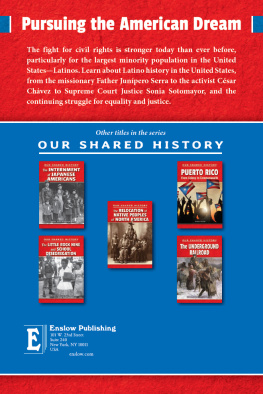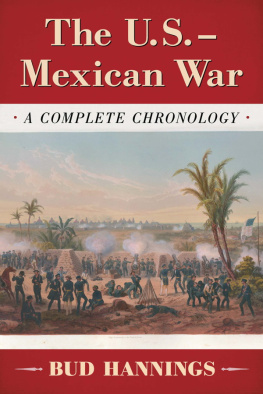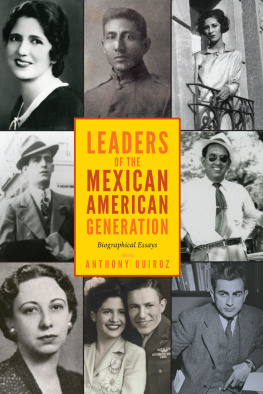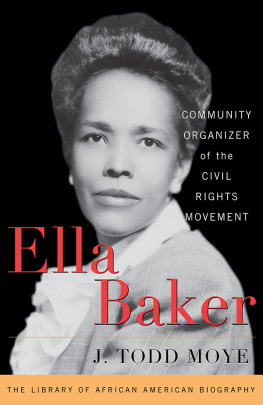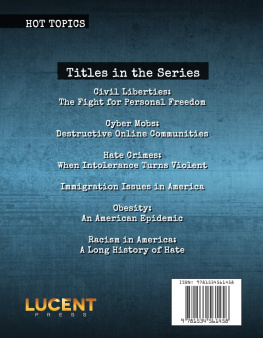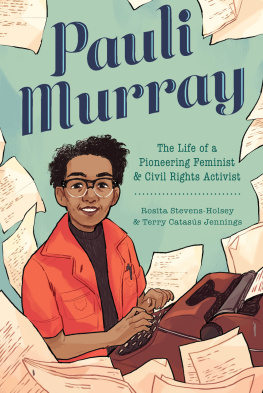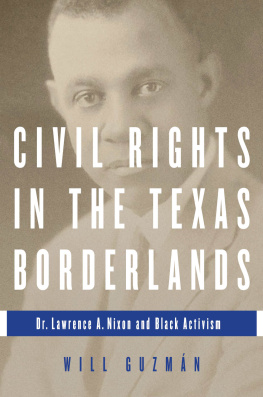Agent of Change
ADELA SLOSS-VENTO, MEXICAN AMERICAN CIVIL RIGHTS ACTIVIST AND TEXAS FEMINIST
CYNTHIA E. OROZCO

University of Texas Press
AUSTIN
Copyright 2020 by the University of Texas Press
All rights reserved
First edition, 2020
Requests for permission to reproduce material from this work should be sent to:
Permissions
University of Texas Press
P.O. Box 7819
Austin, TX 78713-7819
utpress.utexas.edu/rp-form
Library of Congress Cataloging-in-Publication Data
Names: Orozco, Cynthia, author.
Title: Agent of change : Adela Sloss-Vento, Mexican American civil rights activist and Texas feminist / Cynthia Orozco.
Description: First edition. | Austin : University of Texas Press, 2020. | Includes bibliographical references and index.
Identifiers: LCCN 2019020691 | ISBN 978-1-4773-1986-4 (cloth) | ISBN 978-1-4773-1988-8 (library e-book) | ISBN 978-1-4773-1989-5 (e-book)
Subjects: LCSH: Sloss-Vento, Adela. | Women political activistsTexasBiography. | Mexican American women authorsBiography. | Mexican AmericansCivil rightsTexasHistory20th century. | Women civil rights workersTexasBiography.
Classification: LCC F391.4.S56 O76 2020 | DDC 323.092 [B]dc23
LC record available at https://lccn.loc.gov/2019020691
doi:10.7560/319864
CONTENTS
ILLUSTRATIONS
ACKNOWLEDGMENTS
I thank Professor Michael A. Olivas for inviting me to prepare a chapter for his book on Alonso S. Perales, the principal founder of the League of United Latin American Citizens (LULAC), the oldest Latinx civil rights organization in the United States. While working in the Perales archive at the University of Houston, I saw several manuscripts written by Adela Sloss-Vento. Professor Mario T. Garca spurred my interest in Sloss-Vento as a public intellectual when he invited me to prepare a paper for an Organization of American Historians conference.
This gave me the impetus to research other archives at the University of Texas in Austin. Likewise, it gave me cause to look at my own papers, which included letters she wrote me. Arnoldo Vento, Adelas son, readily agreed to collaborate on a book. He allowed me to use his mothers archive at his home in Austin. His wife, Bea, assisted in the project and was a gracious host at their home. After several years of collaboration, we decided to produce two books. This book would not have been possible without their help.
I thank Vicki L. Ruiz, Gabriela Gonzlez, and Teresa Palomo Acosta for their comments and insights. I also thank Christian Kelleher, then at the Nettie Lee Benson Latin American Collection at the University of Texas in Austin, and Lisa Cruces at the M. D. Anderson Library at the University of Houston, as well as librarians at the Jernigan Library at Texas A&M University in Kingsville, Dolph Briscoe Center for American History at the University of Texas in Austin, Bancroft Library at the University of California in Berkeley, Chicano Studies Research Center at UCLA, and Ruidoso, New Mexico, public library.
The work-study students Lorena Aguilar and Niosha Vigil at Eastern New Mexico University in Ruidoso assisted. Halen Anderson helped prepare the manuscript. Sister Irma, a professional Spanish-language translator and Spanish teacher, assisted with translations. I thank the editors at the University of Texas Press.
Special thanks go to my husband, Leo Martnez; my sister Sylvia, who shared her home in Austin; my sister Meta, who shared her home in Houston; and our dog, Lucky.
INTRODUCTION
This book focuses on one of the most important Latinas in the twentieth century. It is a biography of Adela Sloss-Vento of the Lower Rio Grande Valley in South Texas near the US-Mexico border in the twentieth century. I introduce her as a major activist in the Mexican American civil rights movement and a minor activist in the Chicano movement. I also identify her as a public intellectual and a path-breaking woman activist in the male-dominated Mexican American civil rights world and white-male-dominated electoral politics in Texas.
Adela Sloss was born in 1901. Her activist career spanned from 1927 to 1990, over two major eras in Chicano history: the Mexican American civil rights movement and the Chicano movement. Only an extraordinary womanand a feministcould achieve so much in civil rights, public opinion, and politics through civic engagement and writing. And she did so mostly as a wife, mother, and woman employed as a jail matron. She was a movement woman even though she claimed she contributed only a grain of sand for our cause.
This project is unique since it involves my personal relationship with Adela Sloss-Vento, which began in 1978, when I was a twenty-year-old sophomore at the University of Texas in Austin. I was conducting research on the League of United Latin American Citizens (LULAC), the oldest Latino civil rights organization in the United States. It was founded in 1929. Arnoldo Carlos Vento, a professor of Spanish, directed the Mexican American Studies Center at the University of Texas in Austin, where I was a work-study student. Raised by a feminist, Vento took me seriously and connected me with his mother, who began her activism while in her mid-twenties and collaborated with LULACs founders. In 1977 she had just published a book on the Mexican American civil rights leader Alonso S. Perales, the principal LULAC founder.
Sloss-Vento and I corresponded over several years. She saw potential in me as both a young woman historian and someone who could help give Perales scholarly and public recognition. In 1978 she ended a letter to me with this invocation: May God will that more Cynthia Orozcos and Adela Sloss de Ventos surge in the future who honor the memory of Alonso S. Perales. She was not interested in public recognition for herself.
Sloss-Vento helped me with historical research, identifying contacts and thereby suggesting her support of young Chicana professionals in the late 1970s. She contacted Marta Prez Perales, the wife of Alonso S. Perales, so that I could visit his archive housed in their San Antonio home. Using the Sloss-Vento and Perales archives, in 1980 I completed my thesis about conflict between Mexicans Americans and Mexicans at Harlingen, Texas. I was the only person to access the Perales archive before it was acquired by the University of Houston.
I thought Sloss-Vento might be a key to history though she did not encourage me to see her role in Mexican American civil rights activism. On January 25, 1980, I wrote her,
I am trying to find more autobiographical written material on Perales, Senz, Canales and if you have any, on yourself. I would like it to be known that a woman (and at the time, a young woman) was also involved with LULAC. Although they say women did not join LULAC or were involved in it until the Ladies Council, your participation attests to the falsity of this belief. There are many misconceptions about the League; I hope someday I will be able to clear some of them up.
She ignored my request for information about herself but sent me a few newspaper clippings, some of which she wrote. At the time I did not consider Sloss-Vento worthy of more attention. There was no professional training in womens history at the University of Texas when I was an undergraduate in the late 1970s, so I did not know what questions to ask.
When Adela Sloss-Vento died in 1998, Arnoldo Vento invited me to speak about her at a LULAC tribute in McAllen, Texas.
My interest in Sloss-Vento was reignited after a conference on Perales was announced. In 2011 the University of Houston and the Recovering the US Hispanic Literary Heritage Project obtained his archives, and the project and the scholar and lawyer Michael A. Olivas organized an event in 2012. Historians, attorneys, critical race theory scholars, and literary scholars were invited to prepare book chapters. Donna Kabalen de Bichara, Norma Mouton, and I took note of Adela Sloss-Ventos materials in the Perales archive. Since then Kabalen de Bichara authored an essay on Sloss-Vento based on the Perales archive. It was in preparation of the paper that I realized there were enough Sloss-Vento writings to assemble a small book; I approached her son, Arnoldo, and he agreed to collaborate on a modest project.
Next page

